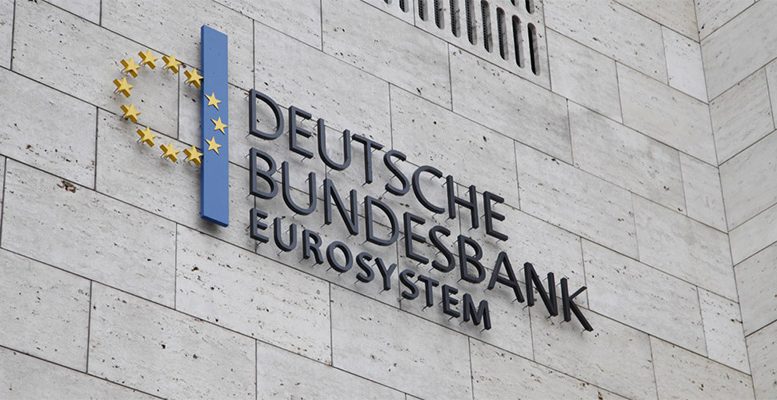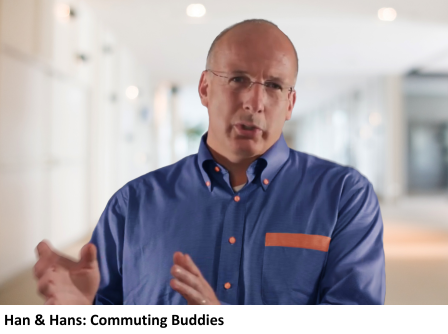
Making money on inside information from the Bundesbank!!!
When I was working in Dublin in the mid 1990s one of the ‘market-moving’ economic variables was German M3. The Bundesbank followed a policy of targeting the money supply M3. They collected weekly data which they published in one of their statistical bulletins but the important data that markets looked at was monthly which was a weighted average of weekly data.
I was doing some analysis trying to reconcile the weekly with the monthly data. The problem was they had different weekly series and I was confused. So I rang the Bundesbank and was put through to a friendly lady in the statistics department. She was helpful. As I checked if I had the right series I said, “So the number for the last week in March was such-and-such a number of Deutschmarks?” She confirmed. And then she said: “and the amount for the first two weeks of April are such-and-such”. I did not have these numbers. Nobody did, they had not been published. I realized this lady was giving me information nobody else had. While that was interesting, it did not help me in any way at that point. But I thought if this lady was willing to give me this data, there might come a point when it could be interesting. So I kept ringing her occasionally to keep the contact going. 
Quite some time later there was an interesting turn in the data. The last week of the month for which the monthly data had been published had shown a modest slowdown in the M3 growth number but that had hardly had a visible impact on the monthly number. But the (unpublished) data for the next two weeks which this lady gave me showed a remarkable slowdown. On this basis, I could make quite a good guess that the next monthly number would also show a pronounced slowdown in M3 growth. The market was not expecting that. Bond yields were set to fall.
We had one fixed-income trader and I told him he should go long Bund futures just ahead of the release of the next set of German M3 numbers. He did not believe me when I told him that I had got hold of unpublished data from the Bundesbank. So he refused. I then got the CEO involved. He decided it was worth having a punt. The decision was made that the trader would buy a small position in Bund futures just ahead of the release.
It worked as I had expected. The number came in well below market expectations and the Bund rallied. Our trader quickly closed the position and we made a little profit on the trade. We must be the only institution that ever made money on inside information from the Bundesbank, one of the most formidable institutions in the world of finance ever. Today, this would perhaps amount to illegal insider trading, but in the early 1990s standards were different.
Shane Lawless does not speak German
Shane LAWLESS was another salesperson at Goodbody Stockbrokers. He and I were going to Frankfurt one day to visit clients in 1995. Several days before, he had shown me a list of clients we were going to meet. It was a good list, but I told him he needed to find the addresses of some of the clients as they were missing. He looked at me rather surprised. He showed me the list again two days later. He had added a number of clients or prospects, but the addresses were still missing. So I reminded him to get the addresses. The day before our trip he showed me the final list. I got a little cross as I pointed out addresses were still missing. He said I must be mistaken, did I not have my glasses on? So I pointed out three appointments all in the afternoon of the first day. He was surprised and said he had put these meetings one after the next as all of these clients had offices in the same street, so it would be easy to find them. I looked again and then I realised that Shane did not have any German and did not know that ‘Postfach’ is not a street name, but means PO Box.
When we arrived at Frankfurt airport and were still on the plane taxiing to the terminal Shane asked me how many airports Frankfurt had. I said I didn’t know - just one as far as I was aware. He said no, there must be more because this one is called ‘Frankfurt Main’, according to huge neon lights on the façade of the terminal building. I had to laugh and explain that Main was the name of the river and that it was added to distinguish ‘Frankfurt am Main’ from ‘Frankfurt an der Oder’ in Eastern Germany near the Polish border.
Almost getting a central banker fired

In 1995, my colleague in Dublin Imelda SEXTON worked at the Central Bank of Ireland. She had been in charge of the money desk and still maintained excellent contacts there. Informally, I should add. At some stage, the Irish pound was under pressure and it was unsure if the Central Bank was going to raise rates or not at a particular meeting. They didn't. Imelda told me that a friend in the Central Bank told her in the strictest confidence of course, that only four members of the board had been present and the voting resulted in a deadlock: 2-2. So rates were left unchanged. The voting record of the policy committee of the Central Bank was not for public consumption. Later that day I had a very long chat with a journalist from Reuters. I accidentally mentioned the 2-2 voting. The journalist put that up on the wires, quoting me. People in the Central Bank saw that and alerted me. I rang the journalist to get her to remove the text. She did, but when the Central Bank demanded the original text, they had to give it. I was grilled about where I had gotten this information, and who was the leak. I had no option but just to claim that it was a rumour I had heard in the market. I had played with fire and almost got Imelda’s friend in big trouble, so stupid.
Back to ABN AMRO and how I ended up commuting for 20 years
In 1997, while I was working for Goodbody Stockbrokers in Dublin I was approached a number of times by ABN AMRO to return to Amsterdam. However, we were happy in Ireland, work was going well and Róisín was close to her dad and wanted to stay. Things changed when the euro was approaching. Ireland was going to be part of the eurozone and the monetary union would marginalise the Irish bond market in which I was working. So when ABN AMRO approached me once again I took it seriously and actually moved. The family moved with me months later. Our time back in Holland wasn’t very happy. Róisín did not like leaving Ireland and the children had problems adjusting to their new schools. After a couple of months, I decided this wasn’t working. We went back to Ireland. I negotiated my way back into Goodbody Stockbrokers and resigned from ABN AMRO. Robert VAN DEN BOSCH, who was then boss, looked for another solution. He suggested I could commute as I had done for some months. I was somewhat pissed off with Goodbody’s as they were not prepared to pay me my old salary. I would have to take a pay cut to get back. Robert’s suggestion to commute did therefore not fall on deaf ears. I asked if I could work from home one day a week. Robert agreed. We were going to do this on a trial basis for a year. 20 years later I am still commuting.
You get used to commuting although catching a 6 am flight on a Monday morning is a bit of a downer. Living in two countries has been interesting as you can see the differences in response to important developments. When Ireland needed financial support in 2010 (along with Greece and Portugal) the Dutch were angry that they had to bail out other countries and we were keen to tell these countries how they should run their affairs. The Irish were furious that the loans came with conditions attached. They were disgusted that their sovereignty was interfered with.
Gerry and Hans: my commuting buddies
I wasn’t the only one commuting. Over the years, I have seen many people commuting for shorter and longer periods, though no one as long as I have. There were several ABN AMRO colleagues plying the route between Amsterdam and Ireland. Gerry ROSEINGRAVE is one of my best friends and our friendship started during our commuting days.
There were several ABN AMRO colleagues plying the route between Amsterdam and Ireland. Gerry ROSEINGRAVE is one of my best friends and our friendship started during our commuting days.
Taking the 6 a.m. flight from Dublin on Monday mornings creates a special bond. It is true that Gerry and I ‘slept together’ for years - once a week - on the plane… Hans VAN DER LAAN, who is involved in the Dutch Irish Business Association in Ireland, and also a friend, was another commuting buddy.
My independence interfered with
The most important asset that I have as the chief economist in a commercial bank is my independence. My credibility depends on it. But, at the end of the day, the bank pays my wages and it is only to be expected that my autonomy comes under pressure once in a while. The bank has almost always respected my independence, except in three cases. For a career that spans 31 years, I think that is an excellent record. Only once was I told what to say specifically. I did not comply. Twice I was asked not to say something specific. I complied in both cases. But I would like to stress I never wrote or said anything that I did not think was right but that the bank wanted me to say.
The first instance occurred in 1997 or 98. The euro was coming and analysts were guessing which countries would qualify to participate. In our view, Italy did not have a hope of qualifying as their debt level was way too high as was their budget deficit. The Italian government was trying its best to make sure Italy would get in. In order to build up goodwill they started issuing debt in foreign currencies. At one stage they were planning a very large issue in Dutch guilders. I think it was going to be for 10bn guilders. ABN AMRO was going to be a lead manager. The Italian government was very sensitive to anybody questioning their euro membership. Shortly before the deal was to go live, the head of the dealing room came up to me and explained the situation. He concluded by saying: “I know you don’t think Italy should be in. And I am not asking you to write anything else, but could you just write about other things at least until the deal is done?” That is what I did. The bond was placed successfully and Italy joined the euro in due course...
The second time senior management interfered with my independence was in late 2008 or early 2009. Fortis had just acquired part of ABN AMRO. There was an internal meeting of lots of senior people of Fortis and the relevant part of ABN AMRO. I was asked to do a talk in Brussels on the economic outlook. The Belgians were in charge. It wasn’t particularly clear at the time but the world economy was going through its worst recession since the 1930s. I was told that my talk should be positive. In the preparation meetings, I told them that I could give some extra attention to the positives but that I wasn’t going to change my overall tone and conclusion from what I believed to be correct. So I gave my talk. As I left the stage, the senior manager who was in charge snarled at me in passing: “that wasn’t very positive”. Piss off, I thought.
The third time senior management interfered with my independence was when the Dutch housing market was down sharply after the crisis. Bank economists in Holland came out regularly with price forecasts that became increasingly negative. We did too. At one stage it was decided that all these increasingly negative forecasts might be reinforcing the downturn and we were asked to refrain from putting out forecasts. We were not told to produce more positive forecasts, just not to issue house price forecasts for a while
Audit: an interesting relationship, but not really my thing
My first encounter with Group Audit must have been in 1999 or so. I was in my second period at the Economisch Bureau and I was surprised that we were going to be audited. But I had nothing to hide and I felt everything we did was well organised and above board. During one of the interviews, the Audit people asked me why we did not apply the ‘four-eyes principle’ to check the economic data in the reports we wrote. I said we always read each other's stuff, but that I did not want well-paid economists checking the data another economist had just
copied from the newswires or a statistical bulletin. I don’t think the Audit people bought into my thinking. They felt that if one economist had written, for example, that inflation had amounted to 2.4% y-o-y in September, that particular number should be verified by another colleague. I insisted their suggestion was pointless. The Audit people kept at it and irritated the hell out of me. In the end, they produced a report in which one of the key findings was that the procedures I followed when hiring staff were insufficient. There was a higher-than-normal risk I might actually hire people with a criminal record. I balked at this. They said they were willing to discuss it but were not going to change this conclusion. I then asked what was going to happen to their report and was told it was going straight to the board. I was furious and thanked them for short-circuiting my career.

Years later, in 2016, the Economisch Bureau was audited again. By now, since experiencing the financial crisis, I had a better understanding and greater appreciation of the importance of Group Audit - everybody in the bank does. But I must admit I was not looking forward to it. So I delegated dealing with Audit as much as I could to Hein SCHOTSMAN, an experienced economist and well-balanced, mature individual. Hein did a great job. Nevertheless, the Audit did not give us a clean bill of health. They had three findings and the overall verdict was ‘needs improvement'. This wasn’t the worst - it was actually the middle ranking out of 5 and one can always improve. Nevertheless, I was seriously annoyed as the next assessment level up was ‘Adequate’. If you are rated one step lower than Adequate, you are really labeled ‘Inadequate’ in my opinion, and I was having none of that. The Audit people argued that our rating was not ‘inadequate’ and that the verdict we had got was not so bad. I made a big fuss. When the final discussion took place, Bert IDE, the head of the Audit group I was dealing with came along. I don’t know if that was standard procedure but it felt as though Bert had decided to join in order to protect the two young women who had carried out the audit. I would never have aggressively attacked these younger women.
Anyway, Bert IDE and I share a passion: Ajax. This is helpful in personal relationships. I accepted the final verdict the Audit had reached. Not long after, though, they changed the standard wording of their overall ratings. I am not sure that had anything to do with me expressing my frustration, but I like to think it did.



